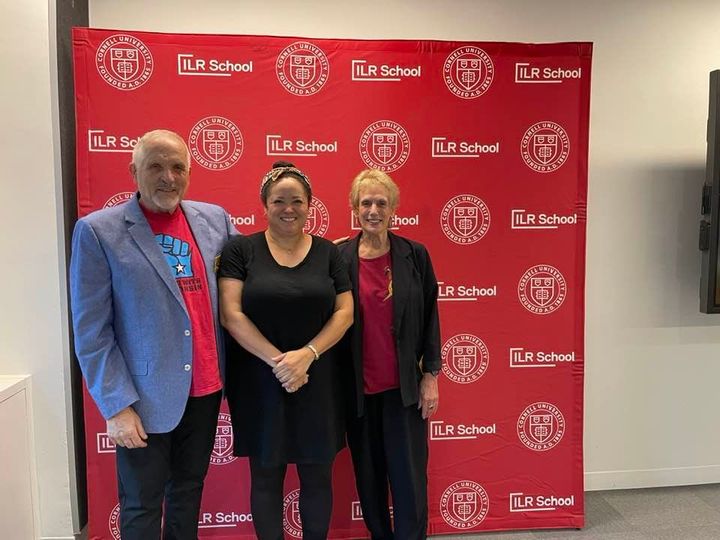No one should have to ask permission to use the bathroom, especially a 51-year-old woman of color working for one of the wealthiest men in the world and dependent on approval from a white guy fresh out of college. The day her supervisor said “no” to a bathroom break was the day Natalie Monarrez signed a card with the Amazon Labor Union at the JFK8 warehouse in Staten Island.
“I had seen enough,” Natalie told me. “Before I was in survival mode, really needing my job. But I realized how bad it was and how much help workers needed.”

Natalie came to New York in 2017 after getting laid off from a long-time position as a workers’ comp examiner in LA.. She’s also a stand-up comic, so she looked for a day job and places to do comedy at night. “If you can pass a drug test, you can get a job at Amazon,” Natalie said. “They’re always hiring” – because, she soon realized, the turnover rate is so high.
But she was shocked to learn the cost of housing in Staten Island. Natalie wound up leasing an SUV and living in it, relying on showers at the gym and charging her phone at coffee houses. She got into a routine of a shift at Amazon followed by the ferry to comedy clubs in Manhattan or Brooklyn or Long Island.
Natalie’s complaints about Amazon were common among its workforce: “We have high production rates and 10-12 hr shifts,” she said, “young male managers with no work experience and no appreciation of what workers go through. They tend to be disrespectful, racist and sexist.” Her experience in workers comp made her highly sensitive to what she saw. “There were a lot of injuries, discrimination or harassment, wrongful termination, and favoritism. I thought, this is a bunch of kids in charge who can’t relate to the workers, people dealing with health issues, families, bills.”
As she got involved with the union drive, Natalie helped broaden outreach to women, people of different ethnicities, older workers. She knew how to talk about unions to those who were new to it and to those who had family members with union jobs. Natalie started spending breaks and evenings in the ALU tent talking to people. “We got to know people,” she explained. “We work here, too, and we understand what they’re going through.” The union started having weekly BBQs. Natalie also talked to a lot of reporters and posted those clips on social media.
With the help of a volunteer attorney, these worker organizers began to file charges with the National Labor Relations Board and with OSHA for denials of bathroom and water breaks. They used the company’s Voices of Amazon to bring up complaints and then set up their own internal channels.
At the same time, management was spending big bucks on union-busting. “They spread anti-union messages in bathrooms, break rooms, exits and entrances,” Natalie said. “Messages were coming by email and text.” At Natalie’s urging, the union began to take photos and blast them on social media.
Natalie went into more detail last month when she moderated a discussion on our novel, Standing Up, at the Cornell Industrial Labor Relations school. The audience loved hearing how she made a video of herself tearing down the propaganda and replacing it with facts about the need for a union. Other workers were inspired to do the same. And when the vote came, JFK8 became the first unionized Amazon warehouse. The company, not surprisingly, is appealing but Natalie knows that the organizing they did has established a critical milestone.
What an honor to have Natalie Monarrez say she loves Standing Up! She called it “an incredible book that all workers will be inspired by!” We thank her for inspiring all of us.
Leave a Reply